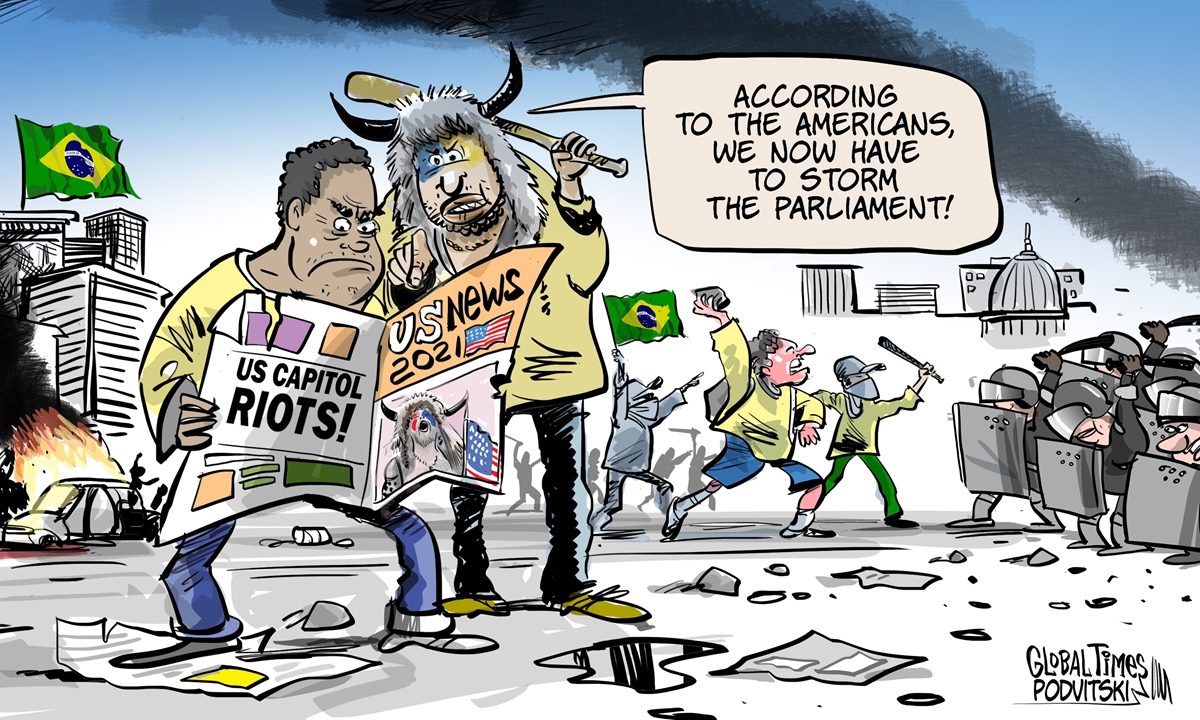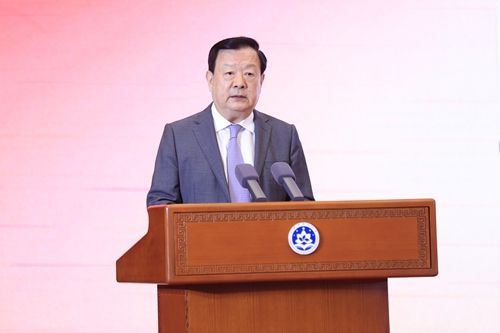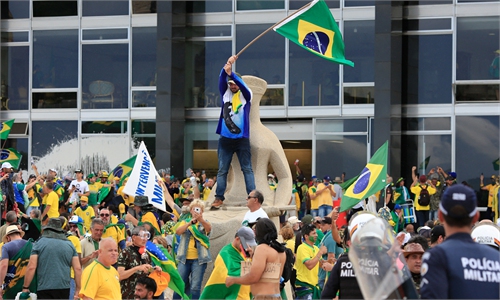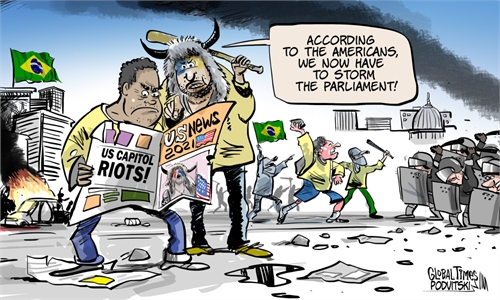Brasília riots affected by political virus from Washington further weaken US democracy

Capitol riots 2.0 in Brazil. Cartoon: Vitaly Podvitski
The riots in Brasília have petered out, but the conundrums facing Washington are just beginning to bubble up.On January 8, supporters of former Brazilian president Jair Bolsonaro, who refused to accept the results of the presidential election, stormed the country's Congress, Supreme Court and the presidential palace. The scene is exactly the same as the one which followed the US presidential election two years ago.
More interestingly, Bolsonaro's governing style had kept itself consistent with that of former US president Donald Trump in recent years. In terms of foreign policy, he aimed at pleasing his political base. In his views, domestic interests are more important than global responsibilities. He followed the decisions of the White House on a number of regional and international affairs.
In his last days in office, Bolsonaro flew to Florida, and was absent from the inauguration ceremony of Lula da Silva; as of Thursday, the self-described definition of identity on his Twitter account is still "President of the Federative Republic of Brazil."
On the next day of the "Brazilian version of Capitol riots," Bolsonaro tweeted a photo showing himself lying on a hospital bed in Orlando, Florida, eager to disassociate himself from the vicious incident. The former president had repeatedly claimed Brazil's voting system is riddled with fraud, and challenged the election he lost. After losing the election, angry Bolsonaro supporters staged protests in many places in Brazil.
These scenes were not unfamiliar to those who observed the US Capitol riots. Democratic Representative Joaquin Castro of Texas accused Brazil's former leader of following Trump's playbook by using false claims of a "rigged election" to incite his supporters and cast doubt over the outcomes of a presidential election.
Whether Bolsonaro has any connections with the riots is not important. One thing is undeniable - Trump virus, a variant of US democracy, has undermined Brazil.
Lula has kick-started his third term as president, 12 years after his last presidency. In his first two terms, he dropped the "neoliberal" development model in the economic field, safeguarded the interests of lower-class civilians politically, promoted social justice, and opposed the US Monroe Doctrine, which sees Latin America as US backyard diplomatically. At one point, like Hugo Chávez, he was an iconic figure in Latin American's "pink tide" or the turn to the left political wave.
Lula's clear stance of being revolutionary, independent, and anti-American won widespread favor among the domestic people. He not only won the only reelection since the Brazilian military "returned power to the people," but also brought the country into an unprecedentedly strong development cycle. Inevitably, he was also regarded as a thorn in the side of domestic and foreign forces who tried their best to maintain the old order.
It is obviously not in the diplomatic interests of the US, nor in line with the US' so-called values, for such an iconic figure of the Latin American left wing, who has a clear political background and conforms to broad public opinion, to regain the presidency.
However, the White House has completely sided with Lula on the issue of Brasília riots. Not only did US President Joe Biden immediately express his desire to stand with the Brazilian people on Twitter, but he also issued a brief but clear-cut joint statement with the leaders of Canada and Mexico.
Such enthusiastic support for left-wing leaders has amazed international public opinion. The "value diplomacy" emphasized by the Democratic Party appears to be worthless in this issue. This has made the world understand once again that no matter how US foreign policy is decorated, it cannot escape the womb of "double standards."
On Capitol Hill, there are significant divisions. In line with the executive branch they control, lawmakers from the Democratic Party took all their anger over the "January 6 riots" out on Bolsonaro. However, the vast majority of lawmakers in the Republican Party opted for selective avoidance, and some have cautiously questioned the demand of ejecting Bolsonaro from the US.
If the legislative branch no longer allows the executive branch to exercise discretion on the issue of whether he will leave or stay, "American democracy" will start a new round of mutation.
The author is executive director of the Latin American and Caribbean Region Law Center of China University of Political Science and Law. opinion@globaltimes.com.cn



